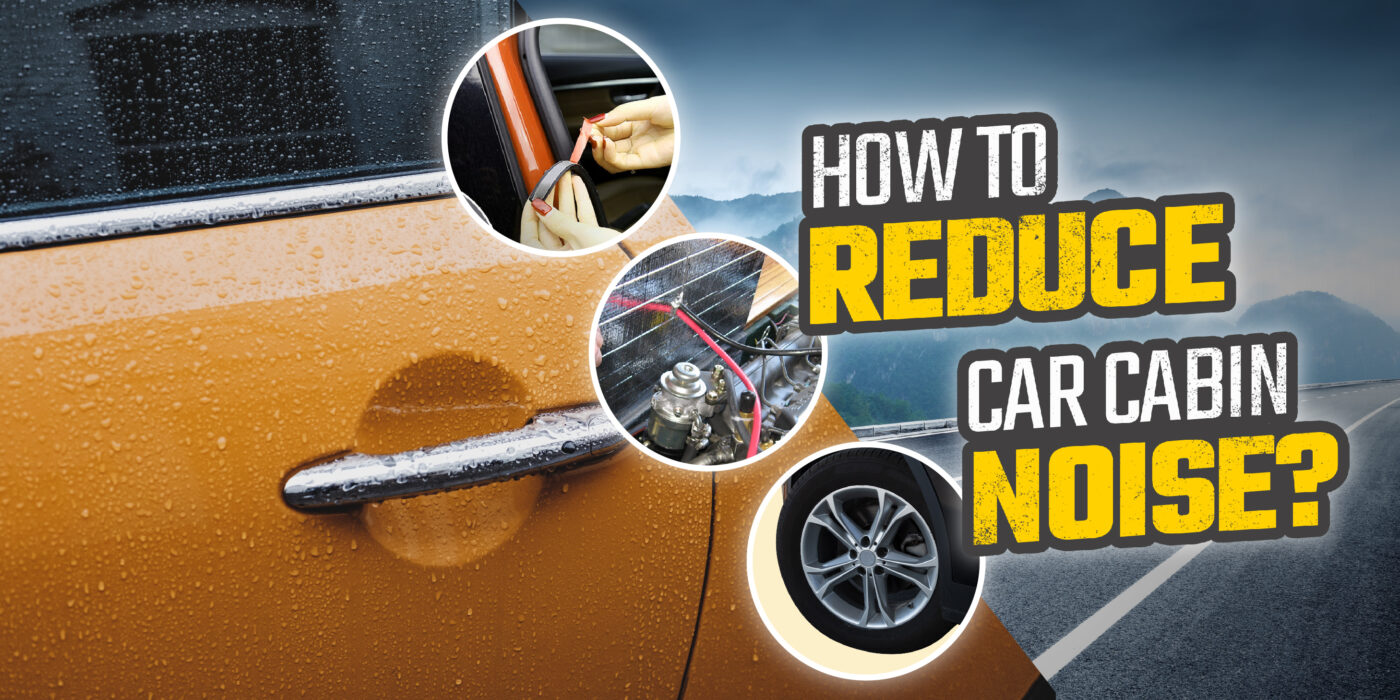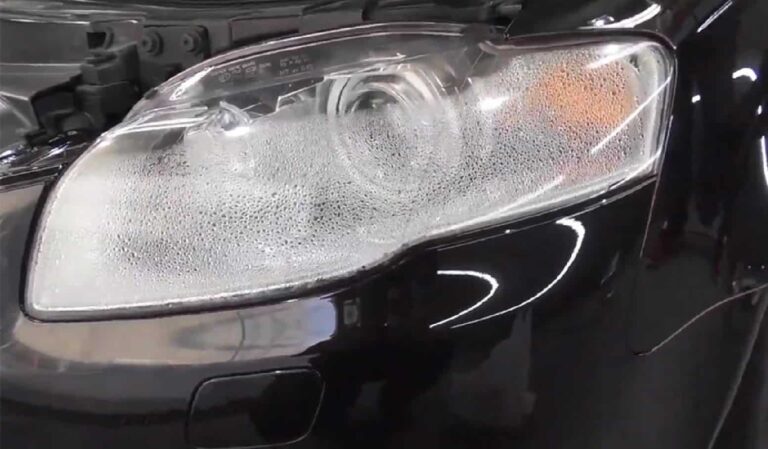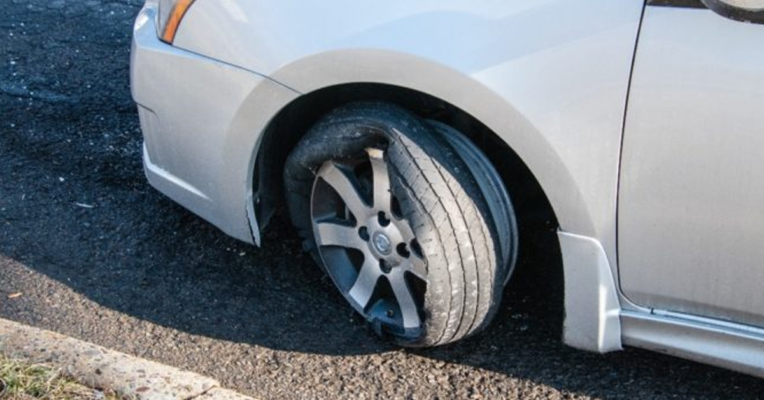
Every car owner knows how annoying and uncomfortable car cabin noise can be while driving. Excessive noise levels can be a source of stress, fatigue and distraction, unsuitable for long drives or road trips. Therefore, drivers should learn how to reduce car cabin noise to create a pleasant and more comfortable driving environment.
In this blog, we will explore common sources of cabin noise and steps on how to reduce car cabin noise. In this way, passengers can enjoy a relaxed journey without any inconveniences.
What is Car Cabin Noise?
This refers to the various source of sounds that are present inside the passenger compartment of a vehicle while it is in motion. These noises can be caused by both external (road, traffic) and internal factors (engine, exhaust)
Mechanical components of the vehicle such as the engine, transmission, exhaust, suspension can transmit noise into the interior. Just the movement of pistons within cylinders, valve operation, crankshaft rotation and all the belts will cause a large number of vibrations which translate to sound generation. Plus, the internal combustion process consists of controlled explosions, while exhaust gases are forced through pipes which further create more noise.
External sources of cabin noise come from the environment or the interaction of the vehicle with the road surface. This includes sound generated by tyres rolling over tarmac, wind noise and from traffic.
Interior cabin noise can affect the comfort of passengers and can differentiate a pleasant journey from an undesirable one. Drivers are often distracted by excessive noise or will get stressed out, which can lead to fatigue and reduced concentration. It can also be hard to have a conversation inside a car, listen to music or be aware of other motorists. Therefore, it is essential to isolate and insulate external and internal sources of noise for the benefit of the occupants of a vehicle.
Here is the list of Top 10 Car Vacuum Cleaner in India For Dust-Free Interiors
How to Reduce Car Cabin Noise While Driving – Strategies for a Quieter Ride
Here are some ways to reduce car noise for a more comfortable drive.
Exhaust System
Exhaust leaks are a major cause of cabin noise and a faulty exhaust system can create a deep rumble as you drive along. Identify any issues with exhaust pipes and fix leaks promptly. Exhaust systems are usually exposed to extreme weather elements and temperatures which lead to corrosion, rust, loose fittings and damage. If you hear any unusual sounds or detect the smell of exhaust fumes, inspect the system and have a professional mechanic repair any damage. In addition to reducing noise, you will also have better fuel efficiency and performance.
If you would like to know more about increasing car mileage, have a look at tips for better fuel economy.
Vehicle Maintenance
Proper engine maintenance makes the difference between a noisy motor and a silent one. Worn-out engine components can contribute to increased noise levels, so it is a good idea to change engine oil regularly, check spark plugs, replace worn-out belts and pulleys and keep the motor running in good condition all the time. The engine cooling system should also work efficiently as an overheating engine could lead to rough operation. Regular maintenance also increases the life of the vehicle and improves overall performance.
Driving
Driving techniques are another way to limit interior car noise. Avoid operating the engine at high rpms, which means less revving. Instead, be gentle on the accelerator and maintain moderate speeds while driving. Shift into higher gears when necessary. High driving speeds contribute to more wind noise which can be distracting on a journey.
Tyres
You might be wondering how to reduce road noise from tires. New tyres are designed to reduce road noise with softer rubber compounds and smooth tread patterns. Together with alloy wheels, tyres have a less unsprung weight attached to them which allows them to rotate without too much vibration. With the right tyre, you will be able to literally glide over the road without any discomfort. Tyres should also be inflated to the correct air pressure and replaced if worn out. Otherwise, small bumps on the road could result in loud sounds and impacts that disturb passengers, especially on bad roads. By keeping tyres in good condition, you can reduce noise levels in your car.
Route Planning
Choose roads that have less traffic and are well-paved with tarmac. Smooth road surfaces can lead to smoother drives and tend to produce less noise than rough or poorly maintained roads. Potholes and speed bumps can significantly increase road noise.
Insulation and Soundproofing
You can reduce car cabin noise by insulating the interior with soundproofing material. Usually made from thick foam or rubber, it is installed in doors, vehicle floors, firewalls, engine bays, trunks and roofs. External sounds are absorbed by these materials which leads to a quieter cabin. This is an intensive procedure which will require dismantling a lot of interior equipment. It is best left to a professional mechanic for best results.
Weather strips
The space between doors and windows can be a source of noise if they are not airtight. Weather strips are pieces of rubber and plastic that form an air-tight seal around doors and windows. They basically create a vacuum effect that isolates external sounds from entering the cabin.
Suspension Issues
Suspension that is not working optimally will lead to loud noise and thumps while driving. Springs can creak and squeak, while bushes may chirp with rough roads, leading to an unpleasant journey. Inspect suspension systems and have them replaced or repaired promptly for a quiet ride.
By addressing these issues, you can effectively reduce interior noise and create a serene cabin atmosphere. They say that the only noise you should hear at 60 km/h in a car is the sound of the electric clock on the dashboard, which was used by some luxury manufacturers in advertisements as a way of demonstrating how quiet their cars were.
Checkout here The 7 Signs Of Bad Ignition Coils In An Engine
The Benefits of a Quiet Cabin
Drivers and passengers can enjoy several benefits from a quieter cabin. Here are some important advantages.
1. Reduced Fatigue and Stress
With excessive interior noise, drivers often feel distracted and stressed out. Loud road noise, especially from the engine and tyres can lead to mental and physical exhaustion. Not ideal for daily drives to the office. Reduced cabin noise can contribute to a more relaxed drive that helps focus and concentration on the road.
2. Easy Conversations
Talking to passengers in the car can be frustrating with too much ambient sound. Even listening to your favourite tunes can be a bother if you don’t have a quiet environment. Low cabin noise makes conversations easy and helps you enjoy music and audio content from your stereo.
3. Increased Comfort
Sometimes you just want to tune out the outside world and maintain peace while you are stuck in traffic. With excessive noise creeping into the cabin, relaxation can be hindered during a journey. By implementing sound reduction techniques, long road trips and everyday drives can be more relaxing.
4. Better Resale Value
It can have a positive effect on a potential sale. A well-maintained car with a quiet cabin will fetch a higher value than other cars. Taking steps to reduce interior noise signifies that a vehicle has been cared for and offers a better driving experience.
Conclusion
By following the advice in this blog, you will not only reduce vehicle interior noise but also enhance your overall driving experience. Addressing the source of noise, changing driving habits and maintaining your vehicle can pay great dividends in the long run.
We hope you gained some knowledge about how to reduce car cabin noise with this article. You can explore more posts on the Carorbis Blog with automotive-related content and the latest news on cars and bikes.
Also, have a look at an Essential Guide On How To Protect Car From Sunlight for tips on car maintenance and How to Clean Cabin Air Filter.
Frequently Asked Questions
Q1. How Do I Reduce the Engine Sound in My Cabin?
Ans. The main cause of engine noise in the cabin is due to exhaust leaks. A defective exhaust can cause a booming or droning sound as you drive. If you find any leaks in the exhaust pipes, have them repaired as soon as possible for a better driving experience. Worn-out or poorly maintained engine components can also increase noise levels. Ensure that pistons, valves and other moving parts are in good condition. The noise level in the cabin can also be reduced by driving slower at lower rpms. Heavy acceleration and high speeds can lead to increased engine noise.
Q2. How can I reduce traffic noise in my car?
Ans. Plan your driving routes to avoid high-traffic areas or roads that are known to have excessive noise levels. Choose less congested routes where you will not encounter stop-and-go traffic or areas where you will be exposed to traffic noise. Driving at lower speeds will reduce engine, wind and tyre noise while avoiding rapid acceleration and braking will keep noise levels at permissible limits. Use the car Ac with the windows closed to keep out unwanted noise from the road. Most modern cars have soundproofing installed in the doors and wheel wells to muffle road noise.
Q3. How Can I Reduce My Interior Noise?
Ans. Installing soundproofing materials is the best way to reduce interior noise in the cabin. These materials come in the form of an insulation foam that is placed on the doors and the floor to absorb unwanted noise. Even the roof can be fitted with soundproofing to create a silent atmosphere while driving. The engine is a considerable source of noise, which is why car owners often add insulation material in the firewall to block engine rumble. Weatherstripping is thick pieces of rubber that form an airtight seal around doors and windows. This vacuum effect prevents noise from penetrating the cabin and provides a smooth driving experience.
Q4. What Causes Road Noise Inside Car?
Ans. Road noise is caused by the interaction of the tyres with the road surface. As the tyre rotates along the road surface, they undergo friction and produce a deep, groaning noise that increases with speed. Another contributing factor is engine noise which gets louder with increased rpms. Internal combustion engines can be quite noisy when driven hard. The road surface also plays a role in noise levels, as rough surfaces will tend to create more noise compared to smooth tarmac. The aerodynamics of a car also determines the amount of noise in the cabin. Car manufacturers design vehicle bodies to cut through the air and therefore minimise the noise levels while driving.
Q5. How to Reduce Tyre Noise in Cabin?
Ans. Tyre noise is inevitable and complete soundproofing may not be possible because they will produce some sound while rotating along the road surface. However, some tyres are designed for reduced road noise by the use of smooth tread patterns and soft rubber compounds. Off-road tyres generally have large treads that tend to make more noise while driving. Remember to inflate tyres to the correct air pressure to keep sound levels in check. It is possible that worn-out tyres will produce a deeper rumble than new tyres, so rotate them regularly and replace damaged tyres as soon as possible. Tyres should be aligned to avoid vibrations and noise due to unbalanced rotation. Alloy wheels are known to be quieter while riding due to their light construction and aerodynamic design.
Q6. How to Reduce Car Body Noise?
Ans. Inspect and repair loose or damaged vehicle components such as bumpers, body panels, exterior trim, etc. These parts tend to vibrate while driving, contributing to increased road noise. Use soundproofing car mats or install insulation material in the car floors, doors, trunk and engine bay to isolate external noise for a soundproof cabin. There are underbody coatings that can reduce car body noise by absorbing vibrations and insulating noise transmission from road surfaces. Suspension systems sometimes can lead to knocking and intrusive sounds due to worn-out springs and dampers. Suspension bushes are small rubber components that absorb shocks and can get noisy when they are damaged.







